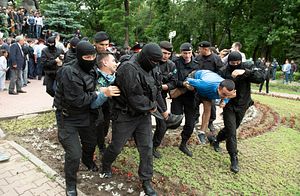On Sunday June 9, Kazakhstan held a presidential election unlike any it has before. First President Nursultan Nazarbayev wasn’t on the ballot, but his chosen successor, Kassym-Jomart Tokayev, was.
There never was any question whether Tokayev would win or not, and win he did: Government-approved exit-polls marked Tokayev as capturing 70 percent of the vote. A bone tossed to the opposition, Amirzhan Kossanov, pulled down upward of 15 percent of the vote.
But the numbers are misleading, at best.
In a statement published Monday, the Organization for Security and Cooperation in Europe, which sent monitors to mind the vote, said, “While there was potential for Kazakhstan’s early presidential election to become a force for political change, a lack of regard for fundamental rights, including detentions of peaceful protestors, and widespread voting irregularities on election day, showed scant respect for democratic standards.”
The OSCE’s preliminary findings of its election observation mission are no surprise. Kazakhstan has the laws providing a “technical basis” for a free election, but significant restrictions on the actual functions that make a free election possible — “freedoms of assembly, expression, association, access to information, and the right to take part in political life” — hold the performance of democracy back. On election day, a generally peaceful and efficient process was interrupted by police arresting protesters; a number of polling stations impeding the access of observers; credible reports of ballot-box stuffing; and organized group voting.
According to the Associated Press, some 500 people were arrested on election day. Twitter was rife with images of protesters being dragged off by police, some in black balaclavas. Eurasianet has a great spread of such images and on-the-ground reporting. Among those detained on election day were a handful of prominent journalists, including Chris Rickleton, of Eurasianet and Agence France-Presse. Rickleton took a selfie from the back of a police van, tweeting that his black eye was the result of a rough arrest in which he fell on a policeman’s knee. His accreditation was taken and while he was released a few hours later, the video footage he and his colleague had taken was erased by police. Saniya Toiken, of RFE/RL’s Kazakh Service, Azattyq, was reportedly arrested, too.
The Kazakh authorities blamed Mukhtar Ablyazov’s Democratic Choice of Kazakhstan, an exile opposition movement banned by Nur-Sultan and labeled a terrorist organization, for the protests.

































